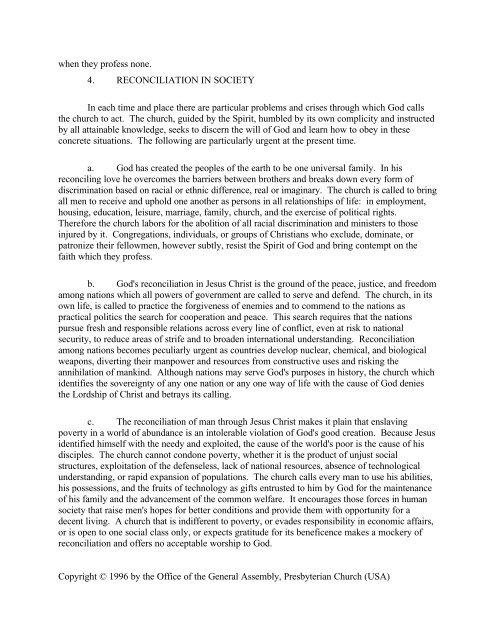The Book of Confessions - The Presbyterian Leader
The Book of Confessions - The Presbyterian Leader
The Book of Confessions - The Presbyterian Leader
Create successful ePaper yourself
Turn your PDF publications into a flip-book with our unique Google optimized e-Paper software.
when they pr<strong>of</strong>ess none.<br />
4. RECONCILIATION IN SOCIETY<br />
In each time and place there are particular problems and crises through which God calls<br />
the church to act. <strong>The</strong> church, guided by the Spirit, humbled by its own complicity and instructed<br />
by all attainable knowledge, seeks to discern the will <strong>of</strong> God and learn how to obey in these<br />
concrete situations. <strong>The</strong> following are particularly urgent at the present time.<br />
a. God has created the peoples <strong>of</strong> the earth to be one universal family. In his<br />
reconciling love he overcomes the barriers between brothers and breaks down every form <strong>of</strong><br />
discrimination based on racial or ethnic difference, real or imaginary. <strong>The</strong> church is called to bring<br />
all men to receive and uphold one another as persons in all relationships <strong>of</strong> life: in employment,<br />
housing, education, leisure, marriage, family, church, and the exercise <strong>of</strong> political rights.<br />
<strong>The</strong>refore the church labors for the abolition <strong>of</strong> all racial discrimination and ministers to those<br />
injured by it. Congregations, individuals, or groups <strong>of</strong> Christians who exclude, dominate, or<br />
patronize their fellowmen, however subtly, resist the Spirit <strong>of</strong> God and bring contempt on the<br />
faith which they pr<strong>of</strong>ess.<br />
b. God's reconciliation in Jesus Christ is the ground <strong>of</strong> the peace, justice, and freedom<br />
among nations which all powers <strong>of</strong> government are called to serve and defend. <strong>The</strong> church, in its<br />
own life, is called to practice the forgiveness <strong>of</strong> enemies and to commend to the nations as<br />
practical politics the search for cooperation and peace. This search requires that the nations<br />
pursue fresh and responsible relations across every line <strong>of</strong> conflict, even at risk to national<br />
security, to reduce areas <strong>of</strong> strife and to broaden international understanding. Reconciliation<br />
among nations becomes peculiarly urgent as countries develop nuclear, chemical, and biological<br />
weapons, diverting their manpower and resources from constructive uses and risking the<br />
annihilation <strong>of</strong> mankind. Although nations may serve God's purposes in history, the church which<br />
identifies the sovereignty <strong>of</strong> any one nation or any one way <strong>of</strong> life with the cause <strong>of</strong> God denies<br />
the Lordship <strong>of</strong> Christ and betrays its calling.<br />
c. <strong>The</strong> reconciliation <strong>of</strong> man through Jesus Christ makes it plain that enslaving<br />
poverty in a world <strong>of</strong> abundance is an intolerable violation <strong>of</strong> God's good creation. Because Jesus<br />
identified himself with the needy and exploited, the cause <strong>of</strong> the world's poor is the cause <strong>of</strong> his<br />
disciples. <strong>The</strong> church cannot condone poverty, whether it is the product <strong>of</strong> unjust social<br />
structures, exploitation <strong>of</strong> the defenseless, lack <strong>of</strong> national resources, absence <strong>of</strong> technological<br />
understanding, or rapid expansion <strong>of</strong> populations. <strong>The</strong> church calls every man to use his abilities,<br />
his possessions, and the fruits <strong>of</strong> technology as gifts entrusted to him by God for the maintenance<br />
<strong>of</strong> his family and the advancement <strong>of</strong> the common welfare. It encourages those forces in human<br />
society that raise men's hopes for better conditions and provide them with opportunity for a<br />
decent living. A church that is indifferent to poverty, or evades responsibility in economic affairs,<br />
or is open to one social class only, or expects gratitude for its beneficence makes a mockery <strong>of</strong><br />
reconciliation and <strong>of</strong>fers no acceptable worship to God.<br />
Copyright © 1996 by the Office <strong>of</strong> the General Assembly, <strong>Presbyterian</strong> Church (USA)




